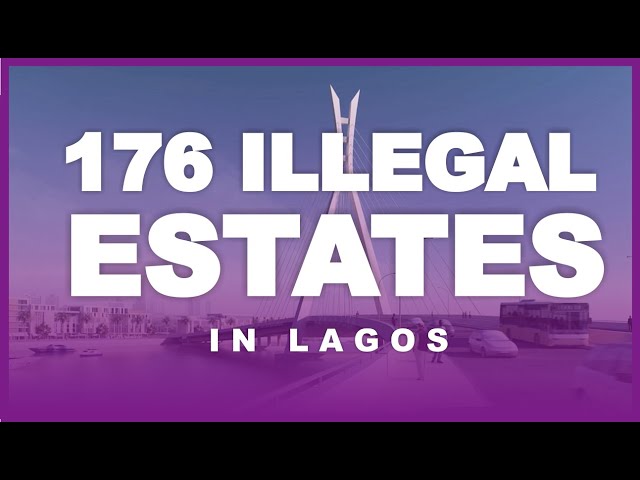…Stakeholders fault timing, demand dialogue, fairer compliance window
By Maduka Nweke
The recent declaration by the Lagos State Government branding 176 estates in the state as ‘illegal’ and issuing their owners a 21-day ultimatum to regularise their documentation has triggered outrage and calls for caution among stakeholders in Nigeria’s real estate sector.
From issues surrounding bureaucratic lapses to concerns over investor confidence and environmental integrity, real estate experts are questioning not just the legality of the move, but its timing and potential ripple effects.
Announced by the Permanent Secretary of the Office of Physical Planning, Oluwole Sotire, the directive targets estates largely concentrated in the high-growth corridors of Eti-Osa, Ajah, Ibeju-Lekki and Epe.
According to Sotire, the estates were developed without obtaining layout approvals from the Ministry of Physical Planning and Urban Development, thus violating the state’s regulatory framework and undermining the T.H.E.M.E.S+ Agenda—Lagos’s blueprint for sustainable urban growth.
“The affected estates undermine the sustainable development goals of Lagos and violate the guiding principles of the T.H.E.M.E.S+ Agenda. We will not tolerate unauthorized developments that disrupt the state’s physical planning framework,” Sotire said.
He stressed that all developers must register with the Lagos State Real Estate Regulatory Authority (LASRERA), which monitors and coordinates activities in the sector.
Among the flagged estates are prominent names such as Adron Homes in Elerangbe, Aina Gold Estate in Okun-Folu, Diamond Estate in Eputu, Prime Water View Garden in Ikate Elegushi, and Royal View Estate in Ikota.
Reverberations in property market
The announcement, Daily Sun learnt, has rattled homeowners, investors, developers and real estate professionals across the state. Many argue that while enforcing planning laws is legitimate, the 21-day timeline is unrealistic and could destabilise the already fragile housing market.
For residents, the directive evokes both confusion and panic. “The timing and the period within which to put their houses in order is very short,” one property owner told Daily Sun.
He continued: “If we were given about three to six months, it would aid most of us. We have various stages to meet the state’s requirements. Three weeks is simply not enough.”
Even within government circles, there is recognition that some affected estates have already begun the process of compliance.
Dr. Olumide Abiodu, Commissioner for Physical Planning, said: “At the end of 21 days, any estate that fails to meet the required conditions will be sealed. But I can tell you that while we are talking, a lot of them have done the needful while others are at various stages of meeting the requirements.”
Ill-timed and ill-conceived, experts note
The decision has drawn sharp criticism from real estate professionals who view the government’s approach as hasty and poorly thought through.
Mr. Chudi Ubosi, Estate Surveyor and Principal Partner at Ubosi Eleh & Co, minced no words:
“It is an unfortunate development, unfortunate in the sense that it is a directive that is ill-conceived. I think the Government and the owners of the estates should just come together and resolve any issues in that regard. This whole thing, if allowed to drag, can impact future developments and create a crisis of confidence even in existing ones, leading to falling asset values.”
Similarly, Mr. Merckson Innocent Okoro, Principal Partner of MI Okoro and Associates, expressed disbelief at how the state’s planning authority could have missed the development of such a large number of estates.
“The Lagos State Physical Planning was there and did not know that developers were developing about 176 estates within the State, particularly within the Lekki axis? Does it mean that these people could just wake up, see land, and go ahead to develop without meeting the necessary layout, site planning, and drainage requirements—and the appropriate authority did not know? It sounds surprising to me,” he said.
Okoro, while conceding that the estates should be sanctioned if rules were breached, argued that the timeframe was simply unworkable.
“Twenty-one days is too small. That’s just three weeks. It’s not possible to acquire the necessary approvals in such a short period. If the government wants to sanction, they can, but not on the basis of this unrealistic timeframe. They should give at least two to six months.”
He went further, calling the development “shameful” for the planning authorities. “Where was the planning authority when these things were taking place? Or could it be that some officers looked the other way? It is a good decision taken wrongly.”
For Mr. Godwin Alenkhe, National President of the Estate and Rent Commission Agents Association of Nigeria (ERCAAN), the directive was a case of good policy executed at the wrong time.
“This pronouncement of declaring 176 estates illegal in the state is ill-timed. Inhabitants of those estates will have documents that some government agencies might have consented to and even made further payments to the coffers of the government. Why are they now clamping down on the inhabitants and owners?”
Alenkhe further warned that such a move could worsen Lagos’s housing challenges at a time when flooding and climate pressures already threaten homes.
“This insensitive decision can further escalate the issue and give room for shanties within communities because many will definitely lose their hard-earned investments. There should be a long-term solution, with enough time given for owners to regularize.”
Environmental issues sprout
On the other side of the debate, environmental experts have applauded the government’s move, arguing that unapproved estates pose severe risks to Lagos’s fragile ecosystem.
Mrs Funmilade Akingbagbohun, former National Chairman of the Nigerian Institute of Mechanical Engineers, explained: “Lagos declared 176 estates ‘illegal’ because they didn’t obtain required layout approvals, which violates planning regulations and compromises sustainable development goals. The environmental hazards, flash floods and the vulnerability of Lekki and Victoria Island, are gradually becoming a menace that can lead to more drastic damage in the future. I commend the Lagos State Government for its commitment to maintaining environmental integrity and safety standards.”
Shocking and destabilising
Mr. Akin OpatoIa, Chapter President of the International Real Estate Federation (FIABCI), described the news as “alarming.”
“My colleague posted it on our WhatsApp group, and since then I’ve received countless calls from clients, colleagues, and investors. While I acknowledge the government’s responsibility to enforce planning laws, this raises critical issues. A blanket classification of these estates as ‘illegal’ could destabilize confidence in the Lagos property market. Such sweeping announcements can affect property values, create panic among residents, and undermine the credibility of ongoing transactions.He urged the government to embrace a more inclusive approach:
“I believe a more transparent regularisation framework is needed, one that prioritises stakeholder engagement, provides a phased roadmap, and supports genuine developers willing to correct past oversights. Let this moment serve not as a crisis, but as an opportunity to reset and build a more transparent, accountable, and investor-friendly state.”
Enforcement and monitoring
Some professionals, however, see the ultimatum as long overdue. Mr. Moses Ogunleye, Managing Director of MOA Planners Limited and Environmental Consultant, said the directive should serve as a “wake-up call.”
“It is illegal for any developer to promote or market an estate without an approved development plan. The state government has waited too long to act. However, the 21-day window is unrealistic. The ministry can consider an extension, but the key is that promoters of the 176 estates should commence the process immediately. Lagosians are going through a lot, and an average property owner pays so much to the government just to keep hold of their investments.”
Need for reforms
At the heart of the debate lies a larger question: How did Lagos allow 176 estates to spring up without approvals? Critics argue that the development points to systemic failures, weak enforcement, bureaucratic lapses, or outright negligence within the physical planning agencies.
Okoro captured the frustration: “It is even shameful for them to be making this public. People have the right to begin to ask questions: where was the planning authority when these things were taking place? Could it be that some officers looked the other way?”
The controversy has sparked calls for structural reforms, including stronger monitoring systems, decentralised planning oversight in rapidly developing areas, and improved transparency to prevent future irregularities.
The 21-day ultimatum has brought Lagos to a crossroads. On one hand, it underscores the urgent need for compliance with urban planning laws in a megacity of over 20 million people battling congestion, flooding, and environmental stress. On the other hand, it exposes weaknesses in governance, raises fears of investor flight, and threatens to destabilize households and communities that may have acted in good faith.
What is clear is that the path forward cannot rely on ultimatums alone. Experts, stakeholders, and residents are unanimous on one point: dialogue, transparency, and phased compliance must replace panic and punitive measures
As Mr. OpatoIa of FIABCI put it: “Let this moment serve not as a crisis, but as an opportunity to reset.”


















Leave a comment